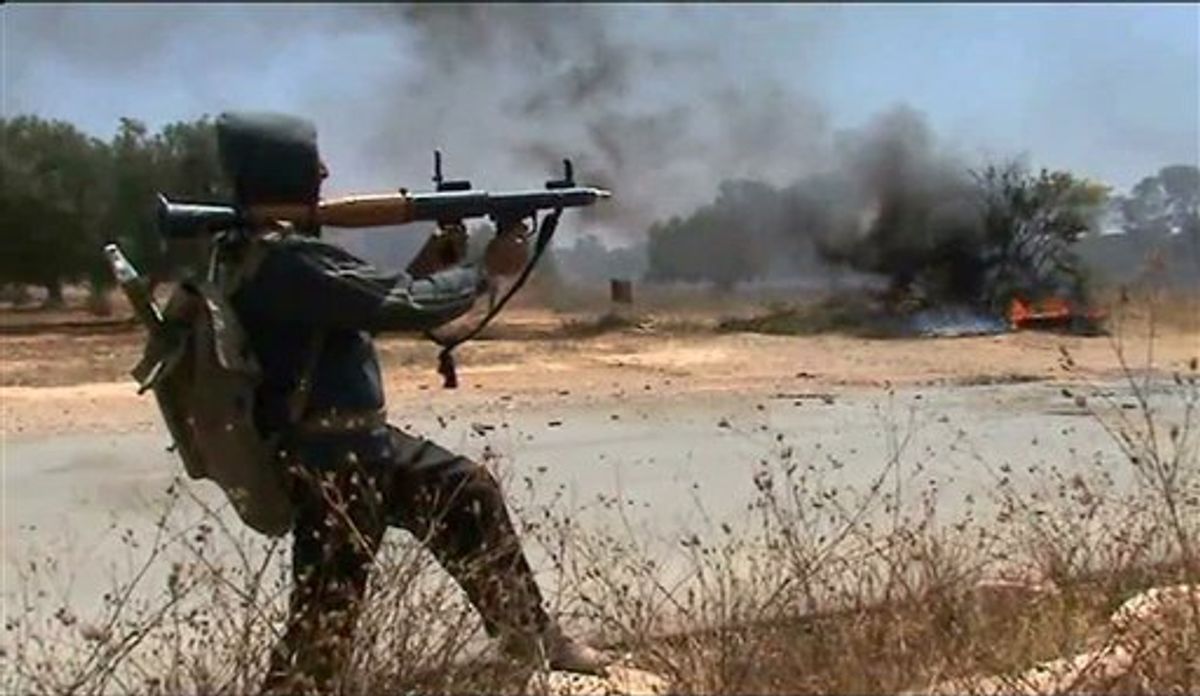The White House is vigorously defending President Barack Obama's right to keep the U.S. military engaged in Libya without congressional approval, but its arguments aren't soothing the anger among Republican lawmakers and anti-war Democrats.
In a report sent to Congress on Wednesday, administration officials said that because the U.S. is in a supporting role in the NATO-led bombing mission, American forces are not facing the "hostilities" that would require the president to seek congressional approval under the War Powers Resolution. That 1973 law prohibits the military from being involved in actions for more than 60 days without congressional authorization, plus a 30-day extension. The Libya campaign has gone on for nearly three months.
The report, which put the cost of U.S. military operations at about $715 million as of June 3, with the total increasing to $1.1 billion by early September, did little to appease lawmakers who have been critical of Obama's dealings with Congress throughout the Libya campaign.
"I'm sure Sen. Barack Obama would have disagreed if he were serving at this time," said Rep. Brad Sherman, D-Calif., a member of the House Foreign Affairs Committee.
Sen. Bob Corker, R-Tenn., said he was amazed that the administration did not believe U.S. forces were facing "hostilities" in Libya, saying generals have told lawmakers otherwise in classified briefings.
"The way the administration handled this entire affair left people on both sides of the aisle very perplexed," said Corker, a member of the Senate Foreign Relations Committee.
Adding to the congressional pressure on Obama, a bipartisan group of 10 lawmakers on Wednesday sued the president for taking military action against Libya without war authorization from Congress. The lawmakers said Obama violated the Constitution in bypassing Congress and using international organizations like the United Nations and NATO to authorize military force.
The White House sent Congress the 32-page report in response to a nonbinding House resolution passed this month that chastised Obama for failing to provide a "compelling rationale" for U.S. involvement in Libya.
The resolution gave the administration until Friday to respond to a series of questions on the mission, including the scope of U.S. military activity, the cost of the mission and its impact on other U.S. wars in Iraq and Afghanistan.
While Obama did not seek congressional consent before ordering U.S. airstrikes against Moammar Gadhafi's forces nearly three months ago, the White House maintained that the president is not in violation of the War Powers Resolution. House Speaker John Boehner, R-Ohio, warned Obama this week that the 90-day window runs out Sunday.
Previous presidents, Republicans and Democrats, have largely ignored the law, which was created as a check on their power to authorize military force.
While the U.S. led the initial airstrikes on Libya, NATO forces have since taken over the mission. The U.S still plays a significant support role that includes aerial refueling of warplanes and intelligence, surveillance and reconnaissance work. Obama has ruled out sending U.S. ground forces to Libya.
"U.S. operations do not involve sustained fighting or active exchanges of fire with hostile forces, nor do they involve the presence of U.S. ground troops, U.S. casualties or a serious threat thereof, or any significant chance of escalation into a conflict characterized by those factors," the report said.
The president has said the U.S. joined the international effort in Libya to prevent the slaughter of civilians at the hands of Gadhafi's forces, a development Obama said could have shaken the stability of the entire region.
Though Obama emphasized that U.S. involvement would be limited in time and scope, the mission already has dragged on longer than many expected. The bombing campaign has halted some of Gadhafi's advances on rebel forces and there are increasing calls from world leaders for him to leave power, but the administration is still struggling to define an exit strategy for U.S. forces.
The report released Wednesday said that if the U.S. were to end its participation in the NATO operation, it would "seriously degrade the coalition's ability to execute and sustain its operations to protect Libyan civilians."
The White House also said in the report that the U.S. is working with Libya's main opposition group, the Transitional National Council, on plans for a political transition if Gadhafi leaves power. Despite initial questions about the council's composition, the White House said in the report that the U.S. is not aware of any ties the group has with any terrorist organization, including al-Qaida and Hezbollah.
The White House and Capitol Hill have been at odds throughout much of the campaign over whether the administration has fully consulted Congress on the mission. Congressional leaders and key committee members were only summoned to the White House the day before Obama ordered airstrikes against Gadhafi's forces. Several lawmakers attended in person, others by phone as Congress had just begun a weeklong break.
Obama aides insist they have briefed Congress extensively throughout, citing more than 30 briefings with lawmakers and their staffs, and 10 hearings where administration officials have testified on Libya.
The White House has called the House resolution chiding Obama, as well as a similar resolution in the Senate, unhelpful and unnecessary. The administration much prefers a resolution sponsored by Sens. John Kerry, D-Mass., and John McCain, R-Ariz., that would signal support for the Libya operation.
White House spokesman Jay Carney said Wednesday that the president expects Congress to support the Libya campaign as it continues. With Gadhafi under pressure to leave power, he said now is not the time to send "mixed messages" about U.S. commitment to the campaign.
------
Associated Press writer Donna Cassata contributed to this report.
------
Julie Pace can be reached at http://twitter.com/jpaceDC.



Shares